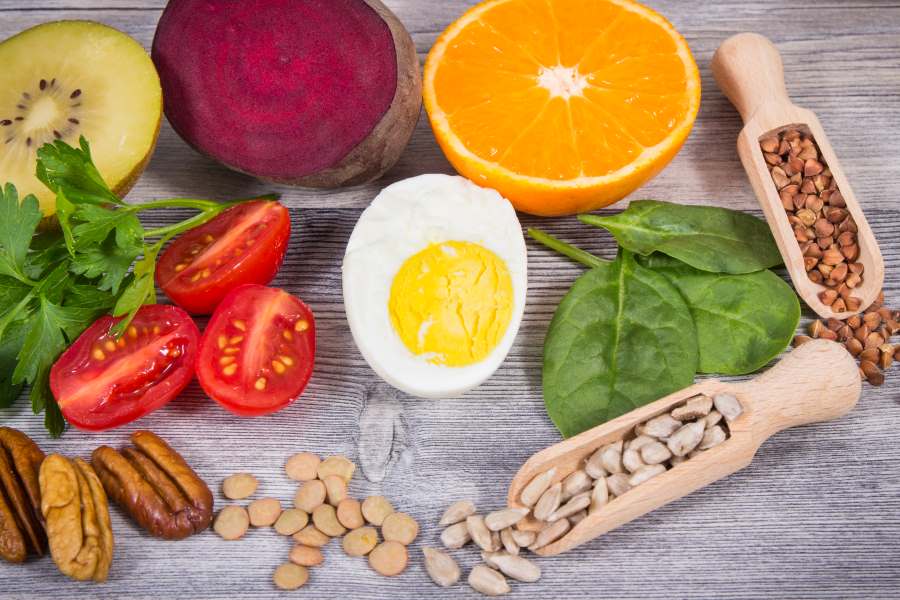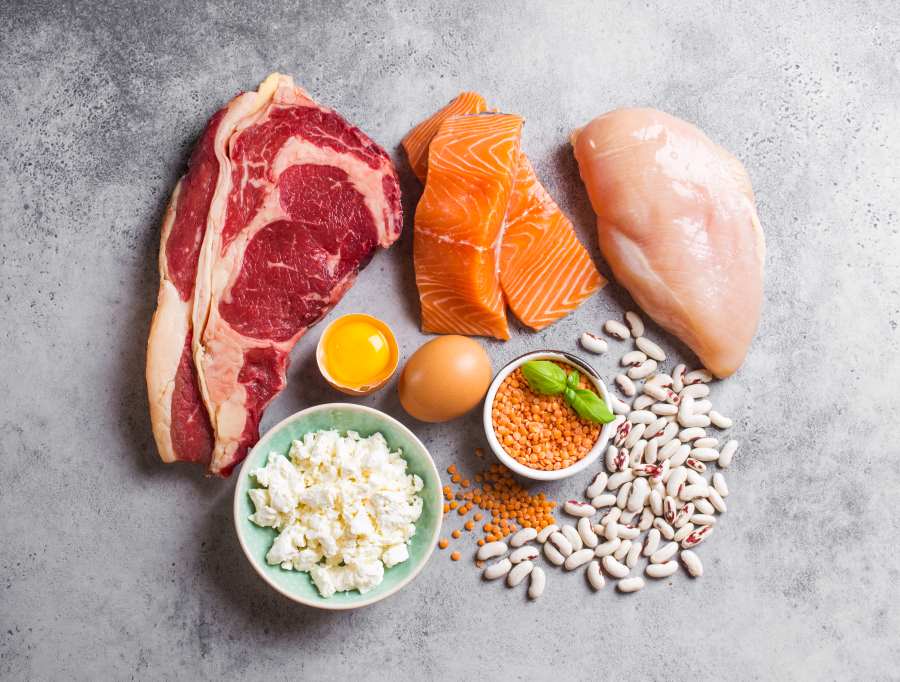What is the Difference Between Vitamins and Proteins?

Foods contain nutrients like proteins, vitamins, carbohydrates, minerals, and water. If the body lacks any of these nutrients, the functionality of the body parts is affected, leading to various health conditions.
Either deficiency can disrupt the body's processes, leading to different health issues. Together, they form the foundation for a balanced and nourishing diet essential for vibrant health and vitality.
In this article, we will primarily talk about the difference between vitamins and proteins.

Table of Contents

What are Vitamins?

Vitamins are organic substances that humans require for normal cellular function, development and growth. There are 13 important vitamins that the human body needs. These vitamins are C, D, A, E, K, B2, B1, B12, B3, B6, B5, B7 and B9. Vitamins are divided into two main categories: fat-soluble and water-soluble. The deficiency of vitamins can lead to several health problems, such as heart disease, cancer and osteoporosis.
What are Proteins?

Proteins are complex and large molecules that play several critical roles in the human body. They do most of the work in cells and are essential for the organs and tissues' structure, regulation, and functioning. Thousands of small units known as amino acids attach in long chains to form proteins.
Differences Between Vitamins and Proteins
Vitamins are organic compounds essential for various metabolic processes; proteins are the building blocks of tissues and catalysts for numerous bodily functions. Understanding their differences is key to crafting nutritious diets that support overall well-being.
The table below shows the difference between vitamin and protein:
|
Category |
Vitamin |
Protein |
|
Functions |
Regulates the metabolic functions in the human body |
Growth, structure, development and functioning of the cells, antibodies, tissues, nucleic acids and enzymes |
|
Types |
Water-soluble vitamins (Vitamin B1, B2, B3, B6, B12, C) and Fat-soluble vitamins (Vitamin A, D, E, K) |
Structural, enzymes, receptors, collagen, keratin |
|
Source |
Vitamins are derived from various foods, including fruits, vegetables, whole grains, and dairy. They are not a direct energy source but are crucial for energy metabolism and other physiological processes. |
Proteins, obtained primarily from foods like meat, fish, beans, and nuts, are a major energy source, providing four calories per gram during metabolism. |
|
Energy |
Do not directly provide energy but play essential roles as cofactors or coenzymes in enzymatic reactions involved in energy production and metabolism. |
Act as a direct energy source through their breakdown into amino acids, which can be converted into fuel for cellular processes. |
|
Structure |
Vitamins are organic compounds with diverse chemical structures. Each plays a specific role in maintaining health and preventing deficiencies or diseases. |
Composed of amino acids linked together in chains, proteins exhibit diverse structures, enabling them to perform various biological functions. |
What are the Benefits of Proteins?
Proteins offer a myriad of benefits crucial for overall health and well-being. From promoting satiety and aiding in weight management to supporting muscle growth and enhancing metabolism, their diverse functions contribute significantly to maintaining optimal physical fitness and vitality.
Here’s a detailed explanation of all the benefits that you can get by including protein in your diet:
- Appetite Control: Proteins help reduce hunger and promote satiety, making individuals feel full for longer durations. Thus, they assist in weight management by curbing overeating.
- Muscle Growth and Strength: Consuming sufficient protein supports muscle repair and growth, enhancing muscle strength and mass, which is particularly beneficial for athletes and individuals in resistance training.
- Bone Health Support: Proteins provide essential nutrients for bone remodeling and repair, maintaining bone mass, ensuring optimal bone health, and reducing the risk of osteoporosis, especially in older adults.
- Enhanced Metabolism and Fat Burning: Protein consumption boosts metabolism and increases the body's fat-burning capacity, aiding in weight management and promoting a leaner body composition.
- Blood Pressure Regulation: Including protein rich foods in the diet can help regulate blood pressure levels, reducing the risk of hypertension and associated cardiovascular complications.
- Weight Loss Maintenance: Protein rich diets effectively sustain weight loss efforts by preserving lean muscle mass, promoting fat loss, and preventing weight regain.
- Injury Recovery Support: Proteins play a crucial role in the body's healing process, aiding tissue repair and regeneration after injury or surgery and facilitating quicker recovery.
- Longevity and Fitness in Aging: Adequate protein intake supports muscle retention and function as individuals age, promoting physical independence, vitality, and overall well-being.
What are the Benefits of Vitamins?
Vitamins offer a multitude of benefits vital for overall health and well-being. From supporting immune function and cardiovascular health to enhancing eyesight and promoting strong bones, these essential nutrients play integral roles in maintaining optimal bodily functions and vitality.
Here’s a detailed explanation of all the benefits that you can get by including vitamins in your diet:
- Stress and Anxiety Reduction: Vitamins play a role in reducing stress and anxiety levels, contributing to mental well-being and overall resilience against psychological stressors.
- Cardiovascular Health Boost: By supporting proper heart function and circulation, vitamins aid in maintaining cardiovascular health and reducing the risk of heart disease and related complications.
- Immune System Support: Vitamins bolster the immune system's response to pathogens, helping to defend against infections and illnesses, thus promoting overall health and vitality.
- Maintenance of Body Functions: Essential for various metabolic processes, vitamins ensure the proper functioning of bodily systems, including digestion, energy production, and cellular repair.
- Enhanced Eyesight: Certain vitamins, such as vitamin A, are crucial for maintaining healthy vision, supporting eye function, and reducing the risk of age-related vision problems.
- Bone Strength Maintenance: Vitamins contribute to bone health by promoting calcium absorption and bone density, reducing the risk of osteoporosis and fractures.
- Support for Healthy Metabolism: Vitamins regulate metabolism, ensuring efficient energy production, nutrient utilisation, and healthy weight maintenance.
Check Other Important Health Metrics Now
Side Effects of Overconsuming Protein
Overconsuming protein can adversely affect health, underscoring the significance of moderation and balanced dietary habits to maintain optimal well-being.
- Kidney Strain: Excessive protein intake can strain the kidneys, as they must work harder to filter out the byproducts of protein metabolism, potentially leading to kidney damage or dysfunction.
- Dehydration: High-protein diets may increase the body's water needs, as the kidneys require more water to excrete the waste products generated from breaking down excess protein. Failure to adequately hydrate can lead to dehydration.
- Digestive Issues: Consuming too much protein can cause digestive discomfort, such as bloating, gas, and constipation, as the digestive system may struggle to break down and absorb large amounts of protein.
- Nutritional Imbalance: Focusing excessively on protein consumption may lead to neglecting other essential nutrients, such as carbohydrates, fats, vitamins, and minerals, resulting in an unbalanced diet and potential nutrient deficiencies.
- Increased Risk of Chronic Diseases: Some research suggests that prolonged consumption of high-protein diets, particularly from animal sources, may be associated with an increased risk of certain chronic diseases, such as heart disease, cancer, and osteoporosis.
Side Effects of Overconsuming Vitamins
Overconsuming vitamins can lead to various health issues, emphasising the importance of moderation and informed dietary choices to support overall health and wellness.
- Toxicity: Excessive intake of certain vitamins, particularly fat-soluble vitamins like A, D, E, and K, can lead to toxicity symptoms such as nausea, vomiting, headaches, and, in severe cases, organ damage.
- Digestive Issues: Large doses of certain vitamins, especially vitamin C, can cause gastrointestinal discomfort, including diarrhoea, abdominal cramps, and bloating.
- Nutrient Imbalance: Overconsumption of vitamins may disrupt the balance of other nutrients in the body, leading to deficiencies or excesses of essential vitamins and minerals.
- Interference with Medications: High doses of vitamins can interfere with the absorption or effectiveness of certain medications, potentially reducing their therapeutic benefits or causing harmful interactions.
- Increased Cancer Risk: Some studies suggest that excessive intake of certain vitamins, particularly antioxidant supplements like beta-carotene and vitamin E, may increase cancer risk in certain populations.
- Hypervitaminosis: Chronic overconsumption of vitamins can lead to a condition known as hypervitaminosis, characterised by symptoms specific to each vitamin, including hair loss, nerve damage, and liver problems.
Vitamins act as crucial micronutrients, supporting various physiological functions, while proteins are the building blocks for tissues, enzymes, and hormones. A balanced diet that includes a variety of vitamin-rich foods and protein sources is key to optimal health and vitality.
These are all the information related to the difference between vitamins and proteins and their benefits. Both of these nutrients are essential for the overall functioning of the body. Hence, there should not be any comparison between proteins and vitamins. The absence or deficiency of any one of these two nutrients can lead to serious health conditions.
Protect What Matters - Explore Other Insurance Options














